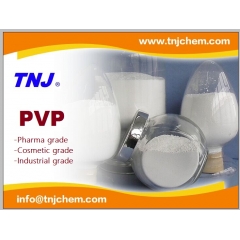Polyvinyl pyrrolidone (PVP for short, PVP K30/ PVP K15/ PVP K17/ PVP K90 /PVP K25 /PVP K60 etc.) is a kind of non-ionic polymer compound, which is the most distinctive and widely studied fine chemical among N-vinyl amide polymers. It has developed into a series of homopolymers, copolymers and cross-linked polymers with a relative molecular weight ranging from thousands to more than one million in three categories of non-ionic, cationic and anionic, industrial, pharmaceutical and food grade, and has been widely used for its excellent and unique performance.
Physical and chemical properties
Density: 1.144g/cm3
Boiling point: 217.6 ° C
Melting point: 130 ° C
Flash point: 93.9 ° C
Average molecular weight: 8000-700000
Stability: stable under normal temperature and pressure
Solubility: It is extremely soluble in water and halogenated hydrocarbon solvents, alcohols, amines, nitroalkanes and low molecular weight fatty acids, but insoluble in acetone, ether, turpentine, aliphatic hydrocarbons and alicyclic hydrocarbons. It is compatible with most inorganic acid salts and various resins.
Properties: It is a white or nearly white powder with hydrophilic property and easy to flow, with slight odor.
Molecular weight
PVP is divided into four grades according to its average molecular weight. It is customary to express PVP with K value, and different K values represent the corresponding average molecular weight range of PVP. K value is actually a characteristic value related to the relative viscosity of PVP aqueous solution, and viscosity is a physical weight related to the molecular weight of polymer, so K value can be used to characterize the average molecular weight of PVP. Generally, the larger the K value is, the greater the viscosity is and the stronger the adhesion is.













 chemical.tnj
chemical.tnj +8618949823763
+8618949823763 tnjchem
tnjchem 2881500864
2881500864